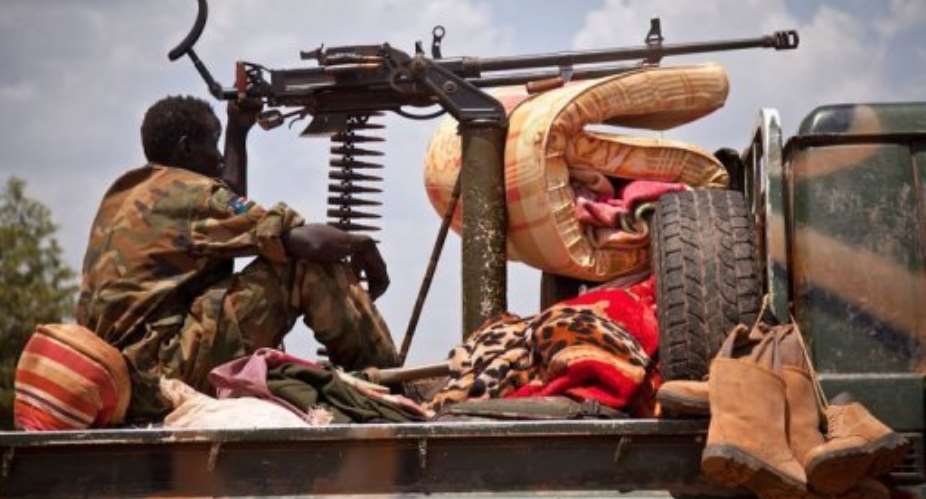KHARTOUM (AFP) - South Sudanese forces have made a diversionary attack near the contested Abyei region, state-linked media in Khartoum said, as international pressure mounted Wednesday to pull the rivals back from the brink of all-out war.
The attack against Sudanese troops occurred Tuesday in the Bahr El Arab River area, 62 kilometres (38 miles) south of El Meiram, said the Sudanese Media Centre (SMC) which is close to the security apparatus.
That area is just outside Abyei -- a potential flashpoint -- and is also along the South Darfur border with South Sudan's Northern Bahr El Gazal state.
The SMC quoted the district commissioner, Colonel Fathi Abd Allah Arabi, as saying the attack aimed to affect Sudanese military plans to recapture the Heglig oil field seized by South Sudan on April 10.
The United Nations, the United States and the European Union have criticised the South's occupation of Heglig, the north's most important oilfield, equally denouncing Sudanese air strikes against the South.
There are widespread fears the fighting, which began with skirmishes in the same area in late March and intensified last week, will spread.
It is already the worst since South Sudan won independence in July after a 1983-2005 civil war which killed two million people.
Sudan has vowed to react with "all means" against the Heglig invasion which many in Khartoum say occurred with surprising ease, and has been called a humiliation for the military.
The UN Security Council on Tuesday discussed possible sanctions against Sudan and South Sudan in a bid to halt a wider war.
The 15-nation council again demanded that South Sudanese troops pull out of Heglig and that the north should end cross-border air attacks, said Susan Rice, the US ambassador and council president for April.
Air strikes have killed several South Sudanese civilians and earlier this week damaged a UN peacekeeping camp in the South's Unity State.
Rice told reporters the council discussed ways to leverage its influence "to press the parties to take these steps and included in that a discussion potentially of sanctions".
The two Sudans are locked "in a logic of war" with hardliners controlling both countries, international peace envoys told the council.
Although South Sudan disputes that Heglig belongs to Sudan, the area is not among the roughly 20 percent of the border that is officially contested.
A United States envoy was expected in Khartoum on Thursday after a meeting in the South's capital Juba with President Salva Kiir.
Princeton Lyman, the special envoy on Sudan and South Sudan, will "essentially stress the same message, which is that we need an immediate and unconditional cessation of violence, and we need both sides to get back to the AU process," State Department spokesman Mark Toner said.
He was referring to talks on a variety of protracted disputes brokered by the African Union. Sudan pulled out of those talks after the Heglig attack.
The US has urged South Sudan to withdraw. But despite its heavy reliance on US aid, Juba has remained defiant with its army vowing to hold its positions.
Sudanese troops defeated the Southern attackers in the skirmish south of El Meiram, the SMC said.
But the South's Sudan People's Liberation Army (SPLA) reported 15 Sudanese troops killed along with seven of its own.
Such figures are impossible to verify.
Southern army deputy spokesman Malaak Ayuen said the clash happened on Tuesday morning in Kiir Adem, a Northern Bahr El Gazal/South Darfur border village on the south bank of the river.
The area is Southern-controlled but disputed.
It is the first reported fighting in the area since the April 10 invasion of Heglig which coincided with Sudanese airstrikes against the South.
Analysts say they have no idea who began the latest fighting in a region where Sudan has tightly restricted the movement of journalists, diplomats and foreign aid workers.
South Sudan President Salva Kiir has set conditions for a withdrawal from Heglig. Among these is that Sudanese forces occupying Abyei must withdraw.
Abyei was to hold a referendum in January last year to determine whether it would be controlled by Khartoum or Juba but the vote was stalled and Sudanese troops seized the area in May.
On Tuesday, the African Union renewed its demand for both sides' forces to leave the region.





 It’s an abuse of power to arrest ECG officials for performing legitimate duties ...
It’s an abuse of power to arrest ECG officials for performing legitimate duties ...
 Unreasonable Actions of GTEC to Collapse Private Universities, Colleges, Institu...
Unreasonable Actions of GTEC to Collapse Private Universities, Colleges, Institu...
 Corruption makes a lot of people rich, happy; NDC, NPP cannot help us – Okyeame ...
Corruption makes a lot of people rich, happy; NDC, NPP cannot help us – Okyeame ...
 GOIL increases fuel prices again, diesel sells GHC14.80, GHC14.99 per litre of p...
GOIL increases fuel prices again, diesel sells GHC14.80, GHC14.99 per litre of p...
 Bawumia will use Ghana’s gold to stabilize the Cedi if voted as President — Ahia...
Bawumia will use Ghana’s gold to stabilize the Cedi if voted as President — Ahia...
 Arrival of state-of-the-art bullet trains signify Ghana’s journey towards enhanc...
Arrival of state-of-the-art bullet trains signify Ghana’s journey towards enhanc...
 Idea behind Performance Tracker is great but shouldn't be limited to election ye...
Idea behind Performance Tracker is great but shouldn't be limited to election ye...
 Election 2024: Bawumia losing 21.8% of NPP’s 2020 Akan votes — Global InfoAnalyt...
Election 2024: Bawumia losing 21.8% of NPP’s 2020 Akan votes — Global InfoAnalyt...
 People are celebrating their 80th birthday and Ghana owes GHS650 billion; who is...
People are celebrating their 80th birthday and Ghana owes GHS650 billion; who is...
 Court issues arrest warrant for Chinese Iron woman, one other over cantonments l...
Court issues arrest warrant for Chinese Iron woman, one other over cantonments l...
